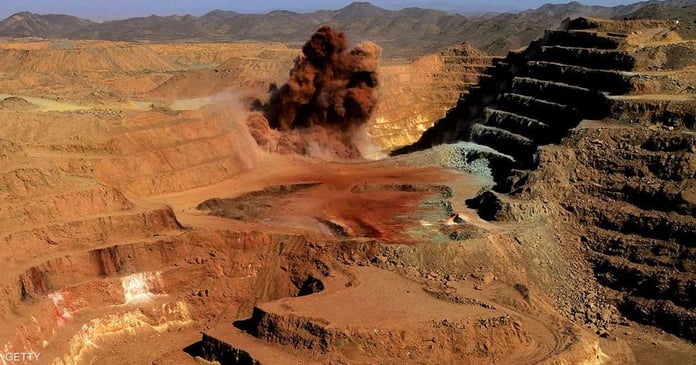Musa has no choice but to stand confused among the rocks of the “Khanaq” mine, about 170 km north of the town of Dongola, gazing at a grim reality staring at him and his fellow miners after their food and water were on the verge of running out, while returning to his family in the West Kordofan region was not possible. The country is possible, because most of the vehicles operating in transport and supplies have broken down due to the scarcity of fuel and its high prices.
Abdo tells “Sky News Arabia” of a real tragedy experienced by thousands of people in the mine in which he resides, after food, water and financial supplies were stopped also due to the reluctance of merchants ” goldsmiths” to buy the mined gold as a consequence of lack of cash liquidity, which will lead to a complete shutdown of mining operations.
And Sudanese youth have found themselves forced to undertake what they call the “journey of death” due to the many dangers they face, and to scatter across distinct regions of their country in search of or after unemployment and poverty hit them because of poverty. the economic conditions of the country, and manual mining also carries the temptation to get rich quick depending on the luck factor.
These incentives have prompted two million people – according to the latest results from the Sudanese Ministry of Mines – to go and work in the manual mines scattered in the Northern States, the Nile, the Red Sea, the South and North Kordofan, and the Blue Nile River, and they have become dependent on it primarily as a source of income over the past decade.
The traditional “manual” mining sector contributes 75% of Sudan’s gold production, which amounts to 93 tons per year, according to reports by specialized international bodies, while official statistics indicate that only around 35 tons of these amounts enter the public treasury per year.
<
p class=””>Stock market crash
The miners rely on the immediate sale of the gold they extract to merchants residing in the local markets near the mining mines so that they can buy food and all their logistical aids to continue working, but the goldsmiths are unable to buy gold due to the shutdown. from Khartoum’s main market, the “golden building” following the military clashes between the army and the Rapid Support Forces.
Hassan Ibrahim, a ‘gold building’ trader, says, “The market was subject to widespread destruction and looting during the events, after everyone had to leave their gold trading shops, as the market is located 500 meters south of the presidential palace, which is a hotspot that has witnessed violent armed clashes.” the last days.”
In his interview with Sky News Arabia, Ibrahim adds: “The closure of the gold building means the cessation of mining operations in all of Sudan due to the absence of other gold trading centers as there is no there is no scholarship. miners cannot continue to work, as they depend on immediate marketing to conduct their business. It was the war that hurt them a lot.
The traditional prospector, “Qasim Al-Qumair”, was able to return to Khartoum after spending 6 months in the gold mining areas of the Nile State, and indicates that great dangers await his fellow prospectors that he left behind. Absence of marketing operations for the extracted gold.
Al-Qamir told Sky News Arabia: “The excavation operations need money to pay for the costs of transporting the stones to the market and then crushing them and washing them with mercury to extract the gold. The explosion of mining shafts also requires the operation of generators. Without fuel, the miners could not continue to work. To work, all will have to go to their families, which creates more social pressure in the cities. .
Choice of difficulty
Since the outbreak of military clashes between the army and the Rapid Support Forces in mid-April, the entire banking system has come to a standstill and the Central Bank of Sudan and commercial banks have closed, which has clouded the overall living conditions. Sudanese citizens and traditional miners have suffered much of the cash crisis.
Musa Abdo, who spoke to ‘Sky News Arabia’ by phone after finding a weak signal at the top of the mountain, said, “He became between two options, the best of which is bitter, either stay there and face it. the specter of starvation, or of venturing home under the fire of war, to build up a new burden.” On his family, whom he had left so soon, he hoped to earn money for the help.
He points out that this reflects the situation of thousands of young people with him in the “Khanaq” mine, which is about 170 km north of the northern state capital, “Dongola”. All now live in a state of conflict between returning empty-handed or continuing the death journey begun before the outbreak of war, fraught with danger and deadly factors, such as mine collapses, mercury poisons, cyanide and all gold extracts.
Read the Latest World News Today on The Eastern Herald.


